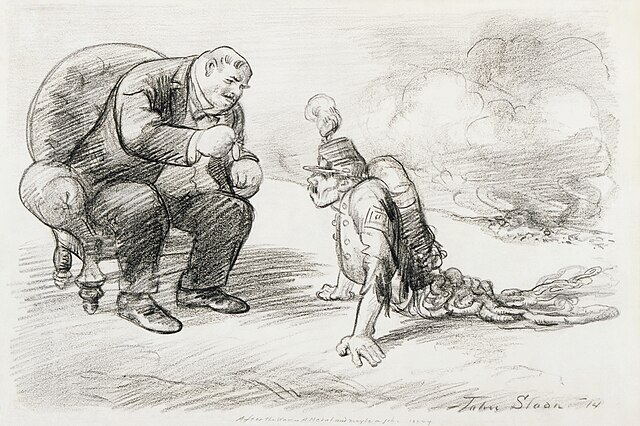Welcome to the Moment of Truth: the thirst that is the drink.
Sometimes ideas will strike me several at a time, and I'm not sure how they're going to fit together. And then other times, like now, no ideas will strike me, and I'll say to myself, "Sure wish I'd set one of those disparate ideas aside for a time like this." But, you know, it's like that story of the ant and the... other ant.
Some things are obvious. And that's okay. Like that song, "Rehab," by Amy Winehouse. Amy Winehouse was a songwriting, musical, and performance genius, but not so bright about moderation. And the song, "Rehab," where she sings about how people are telling her she should go to rehab, but she doesn't want to – it's no mystery who that's about. It's not "You're So Vain." Amy should not have gone to rehab, she should have moved to rehab. She should've just brought all her little kitchen appliances and lamps and stuffed animals and pipes, and moved in. But she didn't want to. And she decayed before our eyes, from the inside out.
There's a couplet in that song that goes like this, "The man said, 'Why'd'you think you're here?' I said, 'I got no idea.'" What do you make of that line, anything? Because to me it sounds like shorthand for a story I heard from a young Irish drunk in Israel back in the spring of '81. His name was Sean, if you can believe it. He lived on the kibbutz where I was, shall we say, stationed – it was Givat Oz, also known as The Reject Kibbutz. Another time, perhaps, I'll tell you about that, and the many times I escaped death during my ulpan.
Sean was roommates with Robert, the hectored intellectual from Montreal, and Ariev, the guitar-playing stoned ladies' man from Montreal. Sean was a storyteller and a fiction writer. And a drunk. And the three of them and whoever dropped by in the evening would sit around drinking, singing songs, discussing poetry and philosophy, and appreciating Sean's stories. Sean was Irish by blood and affinity, but he went to school in Georgia.
And Sean told a story about rehab in Georgia, which was meant to illustrate the hubris and futility of trying to get good-time Charlies like him to give up the sauce.
There was an old guy named Hawkins in the rehab with young Sean, and it was sharing time, and everyone was talking about the horrible things drinking had done to their lives and their loved ones and even to strangers. But old Hawkins would just spin these tales about how he... read more
Welcome to the Moment of Truth: the thirst that is the drink.
Sometimes ideas will strike me several at a time, and I'm not sure how they're going to fit together. And then other times, like now, no ideas will strike me, and I'll say to myself, "Sure wish I'd set one of those disparate ideas aside for a time like this." But, you know, it's like that story of the ant and the... other ant.
Some things are obvious. And that's okay. Like that song, "Rehab," by Amy Winehouse. Amy Winehouse was a songwriting, musical, and performance genius, but not so bright about moderation. And the song, "Rehab," where she sings about how people are telling her she should go to rehab, but she doesn't want to – it's no mystery who that's about. It's not "You're So Vain." Amy should not have gone to rehab, she should have moved to rehab. She should've just brought all her little kitchen appliances and lamps and stuffed animals and pipes, and moved in. But she didn't want to. And she decayed before our eyes, from the inside out.
There's a couplet in that song that goes like this, "The man said, 'Why'd'you think you're here?' I said, 'I got no idea.'" What do you make of that line, anything? Because to me it sounds like shorthand for a story I heard from a young Irish drunk in Israel back in the spring of '81. His name was Sean, if you can believe it. He lived on the kibbutz where I was, shall we say, stationed – it was Givat Oz, also known as The Reject Kibbutz. Another time, perhaps, I'll tell you about that, and the many times I escaped death during my ulpan.
Sean was roommates with Robert, the hectored intellectual from Montreal, and Ariev, the guitar-playing stoned ladies' man from Montreal. Sean was a storyteller and a fiction writer. And a drunk. And the three of them and whoever dropped by in the evening would sit around drinking, singing songs, discussing poetry and philosophy, and appreciating Sean's stories. Sean was Irish by blood and affinity, but he went to school in Georgia.
And Sean told a story about rehab in Georgia, which was meant to illustrate the hubris and futility of trying to get good-time Charlies like him to give up the sauce.
There was an old guy named Hawkins in the rehab with young Sean, and it was sharing time, and everyone was talking about the horrible things drinking had done to their lives and their loved ones and even to strangers. But old Hawkins would just spin these tales about how he... read more
Listen live from 9AM - 1:00PM Central on WNUR 89.3FM / stream at www.thisishell.com / subscribe to the podcast
9:15 - Writer Elizabeth Catte explores the work of building solidarity and resistance in Appalachia.
Elizabeth is author of the new book What You Are Getting Wrong About Appalachia from Belt Publishing.
10:00 - Live from Seoul, Marc Flury explores missile diplomacy, peace talks and other Olympic events.
Marc was trying to get to PyeongChang but I guess the lunar New Year messed up the bus schedule according to his email?
10:35 - Journalist Kate Aronoff explains why Elon Musk owes the public a cut of his private profits.
Kate wrote the article The Case for Nationalizing Elon Musk for In These Times.
11:05 - Political scientist Patrick J. Deneen examines the impending, inevitable collapse of the liberal order.
Patrick is author of the new book Why Liberalism Failed from Yale University Press.
12:00 - Live from São Paulo, Brian Mier sees US involvement in the dismantling of the Brazilian welfare state.
Brian's book of collected interviews, Voices of the Brazilian Left: Dispatches from a Coup in Progress is available now from Brasilwire.
12:30 - In a Moment of Truth, Jeff Dorchen reviews his own movie.
Jeff's movie, in case you weren't paying attention to us plugging it this whole time, is Basmati Blues. He wrote it!
Listen live from 9AM - 1:00PM Central on WNUR 89.3FM / stream at www.thisishell.com / subscribe to the podcast
9:15 - Philosopher Riccardo Manzotti explains why consciousness and the physical world are the same thing.
Riccardo is author of The Spread Mind: Why Consciousness and the World Are One from OR Books.
10:00 - Political scientist Susan Kang looks beyond the progressive illusion of Andrew Cuomo.
Susan wrote the article The Case Against Cuomo for Jacobin.
10:35 - Arielle Sallai and Rachel Reyes of No Olympics LA explain what cities lose when the Olympics take control.
Arielle and Rachel are organizers with No Olympics LA.
11:05 - Investigative journalist Yasha Levine explains why the internet has been a surveillance tool since day one.
Yasha is author of the new book Surveillance Valley: The Secret Military History of the Internet from PublicAffairs.
12:05 - Journalist and stripper Reese Piper discusses strip club raids and worker resistance in New Orleans.
Reese wrote the Medium article New Orleans Is Trying to Shut Down Strip Clubs. Why This Puts My Life In Danger and the op-ed We're real people with bills to pay, have right to work without fear for The Advocate.
12:35 - Our Man in San Juan, Dave Buchen checks in from whatever hasn't been privatized yet in Puerto Rico.
We're talking with Dave for the first time since his three reports in October 2017.
Welcome to the Moment of Truth: the thirst that is the drink.
Like everything else – education, housing, food, medical care – luxury needs to move from being privately owned to being entirely available for public use. Just like Yellowstone and Arches national parks, luxury homes, luxury cars, luxury jewelry, clothes, art materials, foods, wines, all of it. Every bit of luxury available all the time for the public to share.
Oh, no! shouts the person with no imagination. But then no new luxury homes will be built. Who will make exceptional wines if they can't hold them hostage for the highest price the market will bear? The only reason we have luxury at all, you know, is because fabulously wealthy people can own it. Their snotty patronage, their willingness to pay top dollar for excellence, is why excellence exists at all.
Maybe so. After all, ever since the social system under which the great Egyptian pyramids were funded and built, we haven't had a similar project, a gigantic pyramid- shaped tomb wasting land and resources so a self-important egomaniac could be buried with all his servants and animals. I guess we'll just have to enjoy the ones that remain from that beautiful time of enslavement and mass stupidity.
True, without kings, no new palaces need be built. Without private luxury, no new mansions need be built. We'll just have to enjoy the ones remaining from that beautiful time when people were stupid enough to believe that a handful of wealth-hoarders deserved the wealth they hoarded, and were so much better than the rest of us that they merited six or seven or a dozen over-sized private habitats. Maybe, if some of them are so determined to hold onto the old ways, we can display them in their former homes like animals in a zoo.
But surely there are people deserving of luxury, the ossified mind persists. You can't mean to suggest that any old self-appointed sculptor eating raw roadkill by the highway deserves to carve their pedestrian design into a singularly glorious piece of marble! Yes, I do. A great artist will make something great out of anything to hand. We needn't worry about running out of art. We might run out of Art Star art. We might run out of the ego- stroked narcissists who get paid hundreds of thousands for their work. Bless 'em, I don't begrudge their success under the current market-obsessed zeitgeist. But once we throw off the tyranny of the market, if an artist was only... read more
Listen live from 9AM - 1:00PM Central on WNUR 89.3FM / stream at www.thisishell.com / subscribe to the podcast
9:15 - Historian Paul Ortiz explores a Black and Brown history of organization and resistance against imperialism.
Paul is author of An African American and Latinx History of the United States from Beacon Press.
10:00 - Investigative journalist Lara Whyte examines the presence and participation of women in the far-right.
Lara co-wrote the article Why are women joining far-right movements, and why are we so surprised? with Claire Provost for openDemocracy.
10:35 - Black Agenda Report managing editor Bruce Dixon makes a left case against intersectionality.
Bruce wrote the articles Intersectionality is a Hole. Afro-Pessimism is a Shovel. We Need to Stop Digging. and Looking Down That Deep Hole: Parasitic Intersectionality and Toxic Afro-Pessimism. for Black Agenda Report.
11:05 - Historian Roxanne Dunbar-Ortiz views America's history of guns, from the other side of the barrel.
Roxanne is author of Loaded: A Disarming History of the Second Amendment from City Lights Books.
12:05 - Journalist David Cay Johnston explains how the Trump administration is remaking the American government.
David is author of It's Even Worse Than You Think: What the Trump Administration Is Doing to America from Simon & Schuster.
12:45 - In a Moment of Truth, Jeff Dorchen commandeers John Lennon's fancy piano.
Welcome to the Moment of Truth: the thirst that is the drink.
What is justice? Isn't wishing for justice these days like buying a tomato in January? Why do it? What makes you think such a thing is possible? A January tomato? Maybe if you're living in Chile. But you're not, are you? Or maybe you are. But for my purposes today, let's say you're in the Northern Hemisphere, where we might ask the question, is it just for us to receive produce from lands thousands of miles away so we can have unpleasant winter tomatoes?
Answer? Not sure. There are many schools of thought on justice. Is it fairness? Is it just a word, like pennywhistle? Is it a flavor of living, like a little cheerfulness in your day, or a little cucumber in your water? Is it a parabolic, infinitely unreachable limit?
Is justice an ideal, unrealizable? Is it a dream? I'll tell you what, a fine fresh tomato in January is a dream, a dream that will never come true. So if justice is a January tomato, there's your answer. Justice is a little bit grayer than you want it to be, a little bit harder, a lot less delicious.
To everything there is a season. Justice, tomatoes. Stone fruits. Basketball. And when is it justice season here in the United States?
Some might say Justice Season arrived with the #metoo movement. Let's see what that justice is made of. A man in a position of power, formal or informal power, uses that power to force women or even girls against their wills to participate in or observe his sexual gratification. Years later, after having been ignored or gaslit or victim-blamed by the institutions empowering the male abuser, finally these women are listened to and their abusers brought face-to-face with consequences. That's justice.
Or is it too little too late? Or is it both: too little justice too late, but justice nevertheless? I think of the Innocence Project. I think of a man, usually black, who has been sitting on Death Row for most of his life – say, thirty-five years – for a crime he didn't commit. Let's just say for the sake of argument that he never committed a single crime. He was simply framed by the police and the prosecutor. But now, due to the discovery of formerly suppressed exculpatory evidence, he's finally free! Justice has triumphed!
But what if he'd never been railroaded? What if he'd been arrested and, at trial, had been found innocent and set free, never having... read more







